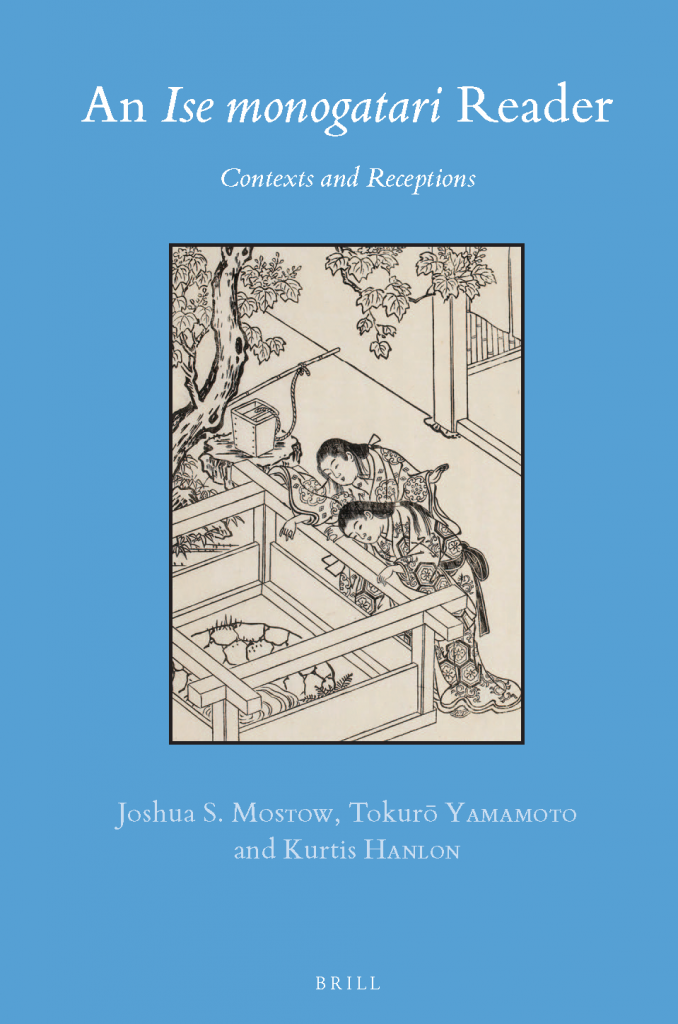

Congratulations to Asian Studies Professor Joshua S. Mostow and Asian Studies PhD student, Kurtis Hanlon on the co-edited publication An “Ise monogatari” Reader: Contexts and Receptions with Professor Yamamoto Tokurō of Kansai University (emeritus).
An “Ise monogatari” Reader is the first collection of essays in English on The Ise Stories, a canonical literary text ranked beside The Tale of Genji. Eleven scholars (Aoki Shizuko, Fujihara Mika, Fujishima Aya, Gotō Shōko, Imanishi Yūichirō, Susan Blakeley Klein, Laura Moretti, Joshua S. Mostow, Ōtani Setsuko, Takahashi Tōru, and Yamamoto Tokurō) from Japan, North America, and Europe explore the historical and political context in which this literary court romance was created, or relate it to earlier works such as the Man’yōshū and later works such as the Genji and noh theater. Its medieval commentary tradition is also examined, as well as early modern illustrated editions and parodies. The collection brings cutting-edge scholarship of the very highest level to English readers, scholars, and students.
In the Q&A below, Kurtis Hanlon, one of the editors of the book, shared his experience in the editing process as a current PhD student. Hanlon’s research focus is on premodern Japanese literature and the intersections of literary and ludic cultures.
What leads you to get involved in this publication project in the first place? And what was your role in this project?
Kurtis Hanlon: I actually did not know I was getting involved as a full co-editor when I was brought into the project as a research assistant. My job at the time was to translate one of the included essays from Japanese to English and then proofread the rest of the English translations that had come in from other grad students and scholars. As time went on, however, I took on whatever roles the other editors needed, which included fact-checking, proofing the pages before publication, creating illustrator files for appendixes, helping create indexes, etc. It was an amazing opportunity to see just the breadth of work that goes into editing a collection of essays.
Were there any challenges in this project? What assistance did your supervisor provide to help you overcome the challenges in this project?
Kurtis Hanlon: When proofreading some of the essays, I found it challenging on a few levels as a graduate student because I didn’t have the self-confidence to feel I was qualified to do it. Some of the translators weren’t native English speakers, so those little errors were easy enough to fix. But then you ask yourself questions like, “Is this change I’m making taking away too much from the writing style of the translator,” “I think this would be a better word choice here, but maybe the translator knows something about the connotation that I don’t,” or “Is my understanding of the original Japanese sentence just way off?” Luckily, my supervisor provided support as the main editor by being the final decision maker on anything I was unsure of. If I left a comment in the document on a passage I was unsure about, he was gracious enough to look at it carefully himself to ensure I was correct or to offer his own take on the phrasing.
What did you enjoy the most about this experience? What skills did you develop or strengthen as a result of this project?
Kurtis Hanlon: I enjoyed the feeling of being a “real” academic. I feel that most graduate students think that editors of essay collections are senior scholars at the top of their fields that make sure every essay is perfect before publication. But my experience really grounded me in the reality of this type of scholarly work: it’s just like all the other scholarly work we do for seminars, presentations, and publications. I feel like it’s not as intimidating as it was before. I also developed quite a few skills with Adobe Illustrator as a result of this project. I had to take a little time and do a little learning, but now if any of my colleagues need a family tree in a format that publishers will love, I can whip one up for them really quick!
What advice would you give to graduate students who are interested in a similar project?
Kurtis Hanlon: My advice would be to have the confidence in yourself that you do have the knowledge and expertise to do this type of editing work. It is important to set yourself up with amazing collaborators, to be sure, but you’ve gotten to this point in your career – you know a lot more than you may feel you do. Trust that expertise, be ready to accept input and changes from your collaborators, and just do the work so that we can get more publications in our field out into the world.


